When you take a generic version of a common drug like HIV antiretrovirals or blood pressure medication, you might not think about the global trade rules that made it possible-or blocked it. But behind every cheap pill is a complex battle over patents, trade deals, and who gets to live. The TRIPS agreement is the invisible hand shaping this fight. Created in 1995 under the World Trade Organization, it forced nearly every country in the world to adopt the same strict patent rules for drugs. For pharmaceutical companies, that meant stronger profits. For millions in poor countries, it meant delayed access-or no access at all.
What TRIPS Changed for Generic Drugs
Before TRIPS, many developing countries didn’t recognize product patents for medicines. They could copy drug formulas using different manufacturing methods, making generics cheap and widely available. India, for example, became the pharmacy of the developing world by producing low-cost HIV drugs that saved millions. But TRIPS changed that. It required all 164 WTO members to grant 20-year patents on drug products, not just the process to make them. That meant even if a drug was made differently, it was still illegal to copy it without permission. The result? Prices for patented drugs jumped. In some countries, the cost of antiretroviral therapy soared by over 200% after TRIPS kicked in. A drug that cost $10,000 per patient per year in 2000 dropped to $75 by 2019-but only where generics were allowed. In places where patent laws were enforced strictly, those same drugs stayed out of reach.The Compulsory License Loophole (That Wasn’t Really a Loophole)
TRIPS didn’t completely shut the door on generics. Article 31 lets governments issue compulsory licenses-essentially, legal permission to produce or import a generic version without the patent holder’s consent. But there’s a catch: the license must be used mostly for the domestic market. So if a country like Malawi needs cheap HIV drugs but can’t make them, it can’t just import them from India, even if India has the capacity. That rule made no sense in practice. A small country can’t afford a full drug factory. It needs to import. But TRIPS blocked that. In 2003, the WTO tried to fix it with the “Paragraph 6 Solution,” allowing countries without manufacturing capacity to import generics made under compulsory license. Sounds fair, right? In reality, it was a bureaucratic nightmare. The paperwork was overwhelming. Legal risks scared off exporters. By 2016, only one shipment of malaria medicine had ever been sent under this system. Only two countries-Rwanda and Canada-ever used it successfully. And even then, it took years of legal back-and-forth. The system wasn’t broken because it was poorly designed. It was broken because it was never meant to work.TRIPS Plus: The Hidden Rules That Make Things Worse
Even after TRIPS, pharmaceutical companies pushed for more. Through bilateral trade deals, rich countries like the U.S. and EU started adding “TRIPS Plus” rules that went beyond what the WTO required. These include:- Data exclusivity: Preventing regulators from using the originator’s clinical trial data to approve generics, even after the patent expires. This adds 5-10 extra years of monopoly.
- Patent term extensions: Extending the 20-year patent beyond its original date for minor changes to the drug.
- Patent linkage: Making generic approval dependent on patent status, so even if a patent is questionable, generics can’t be sold until legal battles are settled.
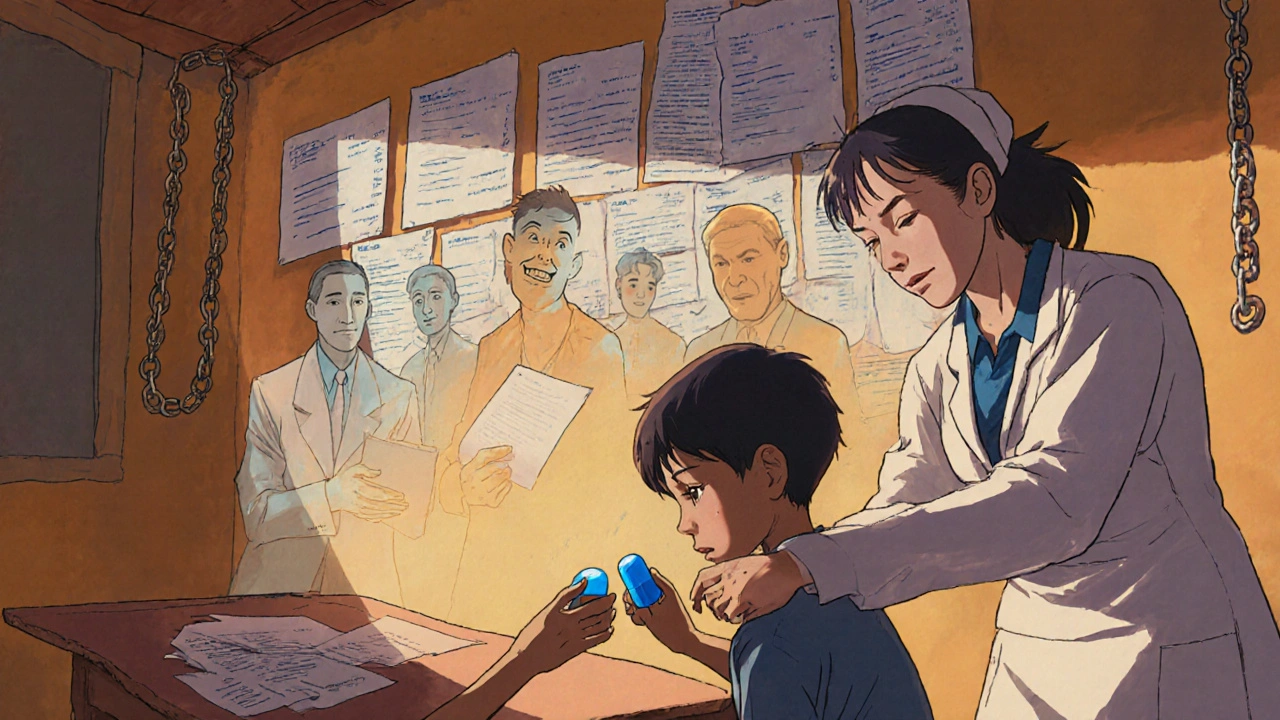
Real People, Real Consequences
In South Africa, the government tried to pass a law in 1998 to let in cheaper HIV drugs. Forty pharmaceutical companies sued them. The case was dropped only after global protests. In Brazil, the government produced generic antiretrovirals in 2000. The U.S. threatened trade sanctions. Brazil stood its ground-and the U.S. backed down. India’s shift to product patents in 2005 caused a 300-500% spike in the price of cancer drugs. A patient who once paid $50 a month for a generic could suddenly be charged $200 or more. Many stopped treatment. The Lancet Oncology study called it a “public health crisis.” Even today, 65% of low-income countries report delays in approving generics because of patent linkage rules they didn’t even ask for-rules forced on them through trade pressure.Who Benefits? Who Pays?
The pharmaceutical industry argues that strong patents are needed to fund innovation. And yes, 73% of new drugs since 2000 came from companies in countries with strong IP laws. But here’s the problem: most of those drugs aren’t for diseases that kill the poor. Between 1975 and 1997, only 13 of 1,223 new drugs were for tropical diseases like malaria or sleeping sickness. Meanwhile, drugs for erectile dysfunction, obesity, and cosmetic conditions got billions in R&D funding. The real innovation gap isn’t in the lab-it’s in the market. Companies invest where profits are high. They don’t invest where people can’t pay. TRIPS didn’t create that imbalance. It locked it in.
The Pandemic Test: Did Anything Change?
When COVID-19 hit, India and South Africa proposed a TRIPS waiver for vaccines, tests, and treatments. Over 100 countries supported it. The U.S., EU, and Switzerland blocked it for over a year. The world watched as rich nations hoarded doses while millions died without access to the same technology. In June 2022, the WTO finally agreed to a limited waiver-but only for vaccines, not treatments or diagnostics. And even then, it was so narrow and complex that no country has used it yet. The waiver was a political gesture, not a solution. Meanwhile, the Medicines Patent Pool-a nonprofit that negotiates voluntary licenses with drugmakers-has helped bring down prices for HIV, hepatitis C, and TB drugs to 17.4 million people. But it only works because companies choose to participate. It’s a Band-Aid on a wound that needs surgery.What’s Next?
The fight over TRIPS isn’t over. New drugs for cancer, Alzheimer’s, and rare diseases are coming. Each one will be patented. Each one will be priced for the rich. Unless countries start using the flexibilities TRIPS allows-compulsory licensing, parallel imports, public health exceptions-they’ll keep paying more for less. Countries like Thailand and Brazil proved it’s possible to stand up to drug companies. But they paid a price: trade threats, political isolation, smear campaigns. The lesson? You can’t rely on goodwill. You need the law on your side-and the will to use it. The global generic medicine market was worth $420 billion in 2020. But that money didn’t go to the poorest countries. It went to shareholders. Meanwhile, millions still wait.Frequently Asked Questions
What is the TRIPS agreement?
The TRIPS Agreement is a global treaty under the World Trade Organization that sets minimum standards for intellectual property protection, including patents on medicines. It came into force in 1995 and requires all member countries to grant 20-year patents on drug products, significantly limiting the ability to produce generic versions.
How does TRIPS affect generic drug prices?
TRIPS raised prices for patented drugs in developing countries by 200-300% after implementation. Generic versions became harder to produce legally, and delays in approval added years to the wait for affordable medicines. In places where generics were allowed, prices dropped dramatically-for example, HIV drugs fell from $10,000 to $75 per patient per year.
Can countries still make generic drugs under TRIPS?
Yes, but with heavy restrictions. Countries can issue compulsory licenses to produce generics without the patent holder’s permission, but only for domestic use. Importing generics from another country under a compulsory license was made possible in 2007, but the process is so complicated that only one shipment has ever been completed successfully.
What are TRIPS Plus provisions?
TRIPS Plus are stricter intellectual property rules added by wealthy countries through bilateral trade deals. These include data exclusivity (blocking generic approval even after patents expire), patent term extensions, and patent linkage (tying generic approval to patent disputes). These rules extend monopolies beyond what TRIPS requires.
Why haven’t more countries used compulsory licensing?
Because of political and economic pressure. When Thailand and Brazil issued licenses for HIV and cancer drugs, they faced threats of trade sanctions and lawsuits from pharmaceutical companies. Many countries fear retaliation, so they avoid using their legal rights-even when people are dying.
Is the TRIPS waiver for COVID-19 vaccines working?
Not really. The 2022 WTO waiver is narrow, applies only to vaccines, and requires complex paperwork. No country has used it yet. It was a political compromise, not a practical solution. The real issue-patents blocking access to treatments and diagnostics-was left out.
What can be done to improve access to generic medicines?
Countries need to use existing flexibilities in TRIPS: compulsory licensing, parallel imports, and public health exceptions. They must resist TRIPS Plus demands in trade deals. Investment in local generic manufacturing and stronger regulatory systems is key. And global pressure must force pharmaceutical companies to stop blocking access in the name of profit.

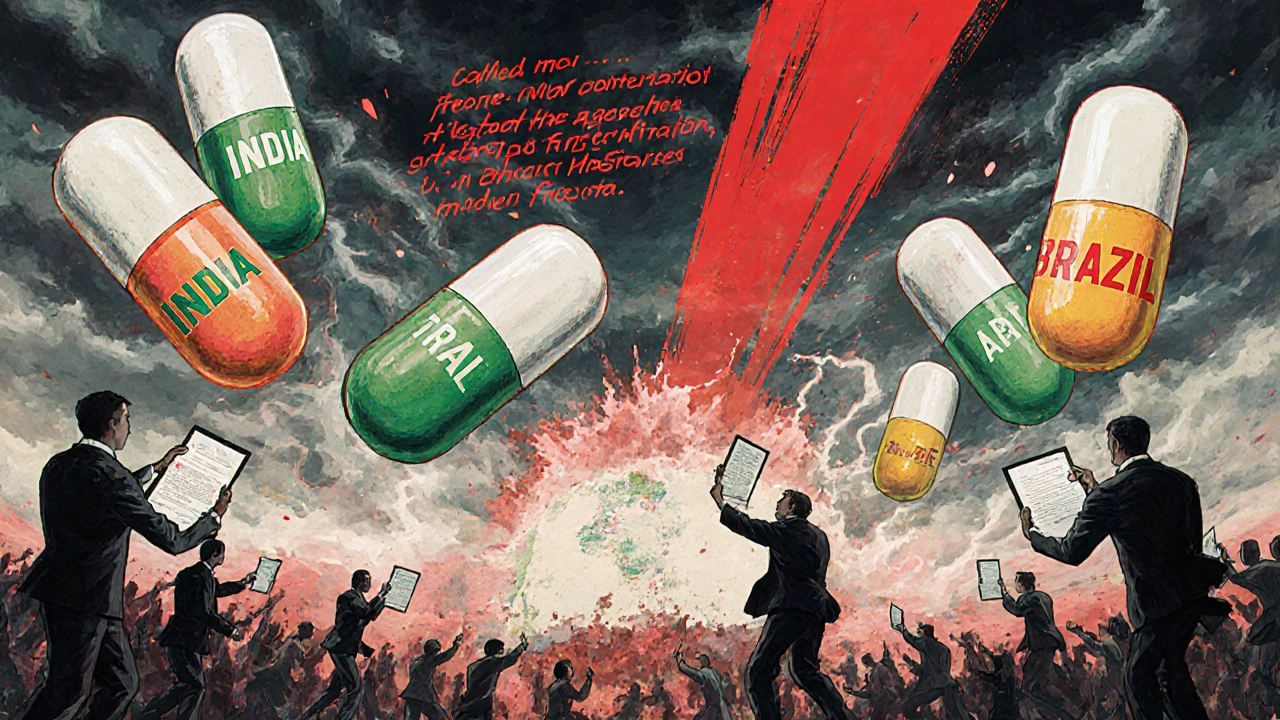
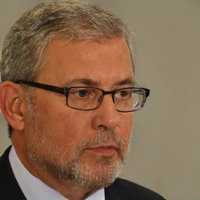

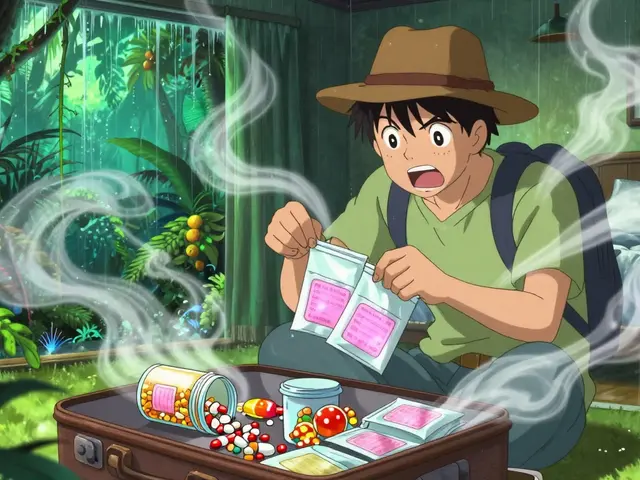
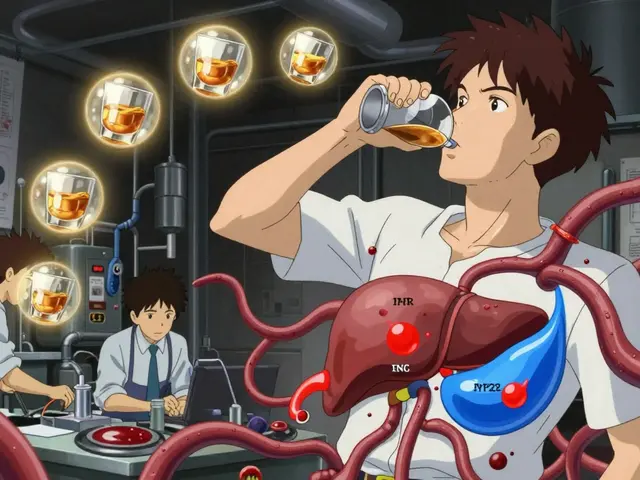
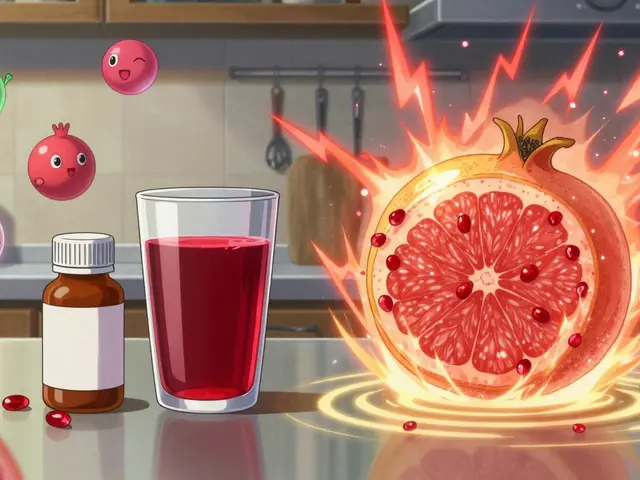
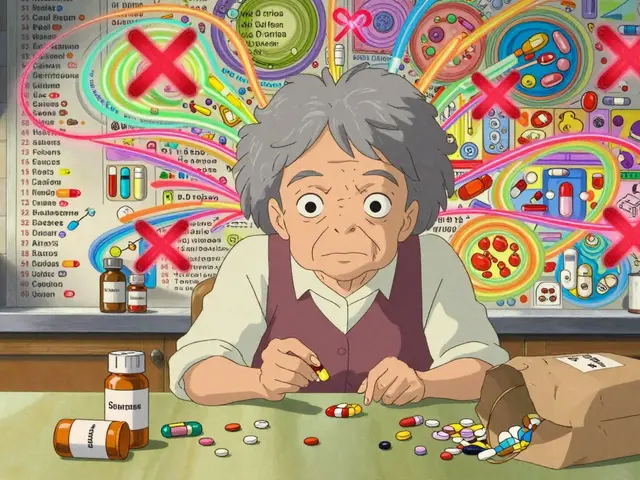

India made generics because we didn't care about your patents. You want to charge $10k for a pill? Fine. We'll make it for $75 and ship it to Africa while you cry into your BMW. TRIPS is a colonial relic dressed in legal jargon. We won. You lost. Get over it.
Let me be clear: this isn't about medicine-it's about power. The West built its wealth on exploitation, then invented 'intellectual property' to keep the Global South in chains. You think patents protect innovation? No-they protect greed. The real crime isn't counterfeiting-it's allowing a handful of CEOs to decide who lives and who dies. Wake up. This is economic apartheid.
It's ironic, isn't it? The same nations that preached free markets now demand monopolies for pharmaceuticals. TRIPS was sold as global harmony, but it was really a corporate takeover disguised as law. The flexibilities exist, sure-but they're like giving someone a key to a locked room and then threatening to sue them if they use it. The system is designed to fail the vulnerable.
Compulsory licensing works when governments have the will. Brazil did it. Thailand did it. India still does it for cancer drugs. The problem isn't the law-it's the fear. Countries are scared of trade wars, not of people dying. We need to stop treating health as a negotiable trade item and start treating it as a human right. Simple. Non-negotiable.
Look the patent system isn't perfect but you can't just ignore it. Pharma companies spend billions on R&D. If you let everyone copy their drugs, who's gonna fund the next breakthrough? You want cheap pills? Fine. But don't act like the industry is the villain. They're just responding to incentives. The real villain is the system that lets governments demand innovation without paying for it.
TRIPS is just step one. The real agenda? They're using patents to implant tracking chips in meds. You think that's wild? Read the 2018 WHO-IBM partnership docs. Every pill you take now is logged. The 'pharma giants' want control over your body data. That's why they blocked the waiver-they need you dependent. The vaccines? They're not about saving lives. They're about building the biometric database of the 21st century.
OMG this is so real!!! I just saw a video of a mom in Lagos crying because she couldn't afford her kid's asthma inhaler while Big Pharma CEOs were on yachts drinking champagne!!! 😭💸 WHY DO WE LET THIS HAPPEN??? TRIPS IS A SCAM!!! #JusticeForGenericMedicine #PharmaIsEvil #IndiaIsTheHero
They don't just block generics-they weaponize bureaucracy. The Paragraph 6 Solution? It's not broken. It's a trap. The forms are written in legalese no small nation can afford to translate. The legal risks? They're designed to scare off any exporter who might help. And the silence? That's the real victory. No one talks about it because the system is engineered to make resistance feel hopeless. But it's not. It's just expensive.
People forget the real win isn't just cheap pills-it's that India proved you can do it. They built a whole industry around saving lives. That’s innovation too. Not in a lab coat. In a factory. With dignity. We don't need more patents. We need more courage. And we need to stop pretending profit and survival have to be enemies.